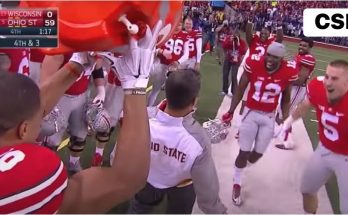Brian Kelly now holds the second-largest buyout in college football history, a staggering figure that has sent shockwaves through the world of college athletics. It is a reflection not only of the immense financial stakes tied to elite college football programs but also of the ever-evolving dynamics of coaching contracts in the modern era. Kelly, one of the most accomplished and polarizing figures in the sport, has built his reputation through decades of success, leadership, and a relentless pursuit of excellence. Yet, this buyout figure has once again placed him at the center of national attention, illustrating both his value to LSU and the enormous risks athletic departments now take in pursuit of championship glory.
In the high-stakes world of college football, money talks — loudly. Universities that aspire to compete for national titles have found themselves caught in an escalating arms race, not just for the best players, but also for the best coaches. Contracts worth tens of millions have become the norm, and buyouts have ballooned to astronomical levels. For Brian Kelly, this new distinction cements his place not only as one of the highest-paid coaches in the game but also as one of the most financially protected. His buyout, now second only to the legendary figure attached to Alabama’s Nick Saban before his retirement, underscores just how much LSU values stability and continuity under Kelly’s leadership.
When Kelly left Notre Dame for LSU in late 2021, it was one of the most shocking and talked-about moves in recent college football history. At the time, it was reported that LSU offered him a massive 10-year contract worth nearly $100 million, complete with incentives, performance bonuses, and other financial sweeteners that made it one of the most lucrative deals ever offered to a college coach. The move was a statement — LSU was not content to merely compete; it wanted to dominate. To do so, the Tigers were willing to invest heavily in one of the most proven program builders in the nation.
Since taking the reins in Baton Rouge, Kelly has made it clear that he’s not just there to coach; he’s there to transform. His first season with the Tigers showed flashes of promise, including a dramatic upset win over Alabama that instantly restored national relevance to LSU football. The following seasons have been a blend of high expectations, offensive firepower, and the ongoing challenge of maintaining consistency in the ultra-competitive SEC. But regardless of the on-field ups and downs, Kelly’s contract ensures that LSU’s commitment to him remains unwavering — and incredibly costly should the school ever decide to part ways.
The size of the buyout speaks volumes about how far college football has come from its more modest beginnings. Two decades ago, a multimillion-dollar buyout was considered an anomaly. Today, it’s a standard line item in the budget for top programs. The logic is simple: the right coach can mean the difference between mediocrity and national prominence, between packed stadiums and half-empty bleachers, between financial surplus and fiscal struggle. Athletic departments see these contracts as investments — high-risk, high-reward bets on leadership and vision.
For LSU, Brian Kelly represents precisely that kind of investment. He’s a proven winner with an unmatched ability to recruit, develop talent, and build systems that endure. From his early days at Grand Valley State, where he won two Division II national championships, to his tenure at Notre Dame, where he became the school’s all-time winningest coach, Kelly’s track record speaks for itself. His coaching philosophy is grounded in discipline, precision, and adaptability — qualities LSU believed were essential for returning the program to championship contention.
Still, the magnitude of his buyout raises broader questions about the financial sustainability of college athletics. When a single coach’s buyout can rival the operating budgets of smaller athletic departments, it prompts discussions about priorities and balance. Critics argue that the escalating salaries and buyouts in college football have created a distorted ecosystem, where the pressure to win has overshadowed the educational mission of universities. Supporters, on the other hand, contend that football success drives revenue, boosts enrollment, and elevates the entire institution’s profile, making these investments worthwhile.
In the context of LSU’s ambitions, Kelly’s buyout is both a shield and a statement. It protects him from premature dismissal amid inevitable growing pains, and it signals to recruits, boosters, and fans that the program is all-in on his leadership. Such financial protection can also foster stability — a commodity often in short supply in major college football. When coaches know their job security isn’t immediately threatened by a couple of losses, they can focus more on long-term program development rather than short-term results.
However, the flip side of such massive buyouts is the financial strain they can impose if things go wrong. Athletic departments are often under immense pressure to produce winning teams, and when expectations aren’t met, buyouts can become albatrosses. Schools that rush to fire coaches must then pay not only the outgoing coach’s buyout but also the salary of a replacement, often with another buyout clause attached. The result is a cycle of escalating costs, where losing can be as expensive as winning.
For Brian Kelly, though, the current moment is one of validation. His ability to command such a significant buyout reflects his stature within the sport and the confidence LSU has in his leadership. Even amid fierce competition and criticism, Kelly has remained steadfast in his belief that LSU can once again rise to the pinnacle of college football. His recruiting classes have ranked among the nation’s best, and his offensive philosophy continues to evolve with the modern game, blending traditional structure with creative innovation.
Fans and analysts alike have debated whether Kelly can deliver LSU’s next national title. While some question whether his style fully resonates in the SEC — a conference defined by swagger, speed, and southern flair — others see in him the kind of strategic mastermind capable of outthinking the competition. His attention to detail, emphasis on preparation, and knack for developing quarterbacks have already begun to shape the Tigers’ identity in new ways.
As college football continues to evolve, so too does the business side of the game. NIL deals, transfer portals, media rights, and billion-dollar stadium projects have transformed the landscape beyond recognition. Within this context, Kelly’s buyout represents not just a number but a symbol — a marker of how valuable coaching leadership has become in a sport that now operates like a professional enterprise. It’s no longer just about X’s and O’s; it’s about vision, branding, culture, and the ability to navigate a rapidly changing environment.
At the same time, this financial arms race comes with moral and institutional implications. As universities continue to allocate massive resources toward football programs, questions arise about fairness, equity, and educational integrity. Student-athletes now have more power than ever before, but the financial disparity between coaches, players, and other sports programs remains stark. The enormous buyouts serve as a reminder of where the power truly lies — and how the pursuit of championships often comes at a steep price.
Still, for LSU fans, Brian Kelly’s presence represents hope. Hope for another national title, for sustained excellence, and for a return to dominance in the most unforgiving conference in the sport. His buyout, while enormous, is ultimately a reflection of that hope — a financial embodiment of faith in his ability to deliver results. And if he succeeds, LSU’s gamble will be remembered not as excessive, but as visionary.



